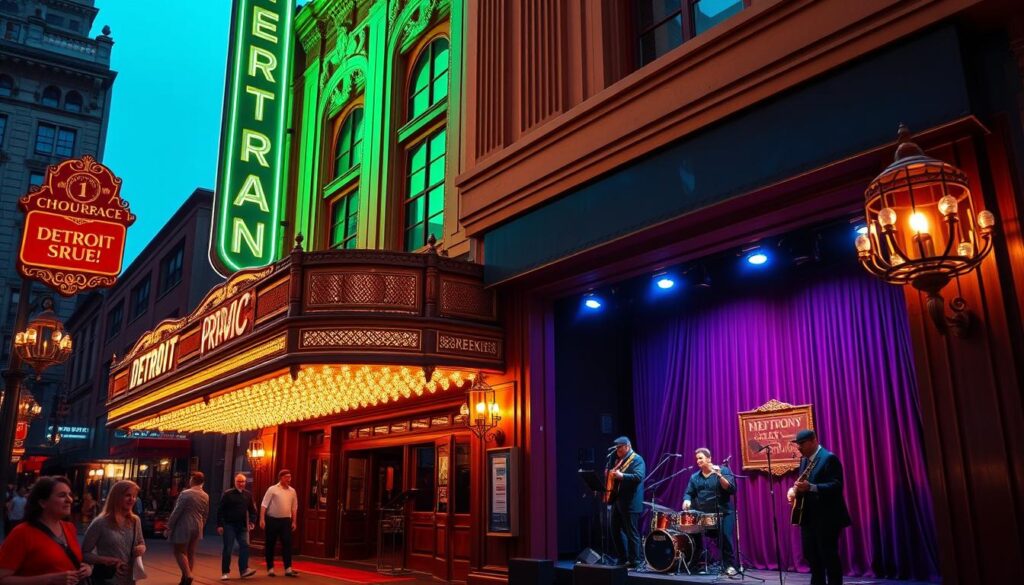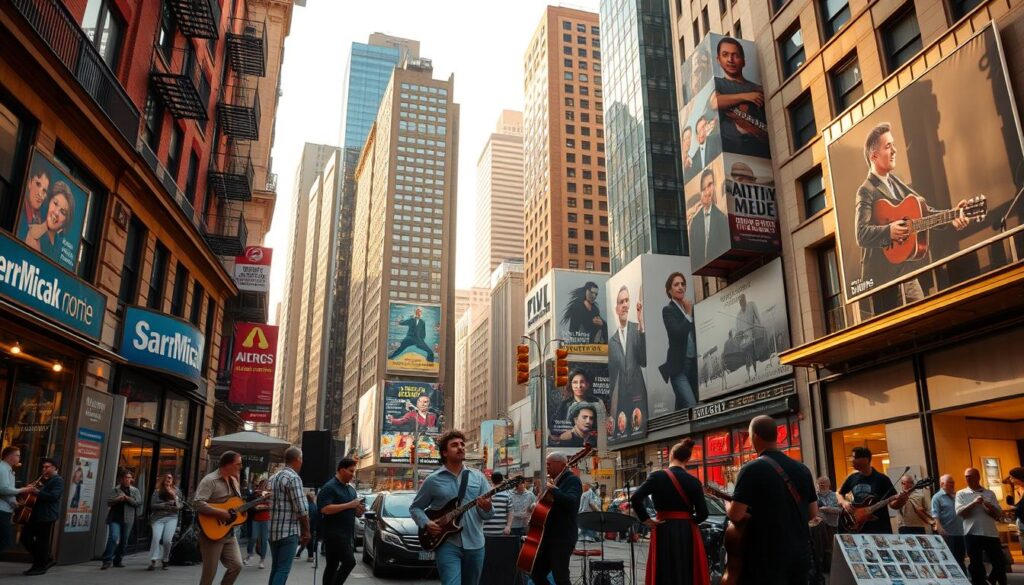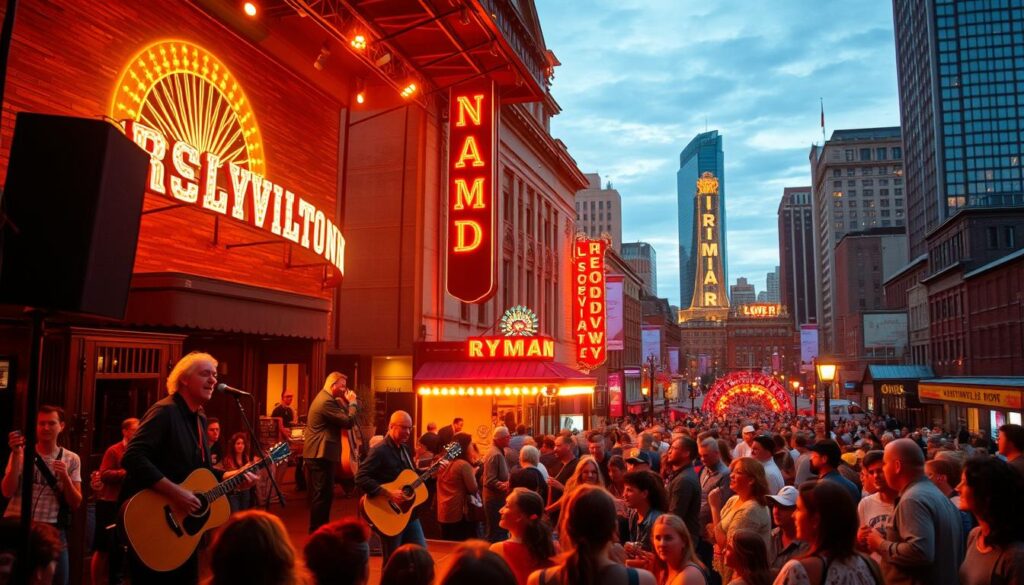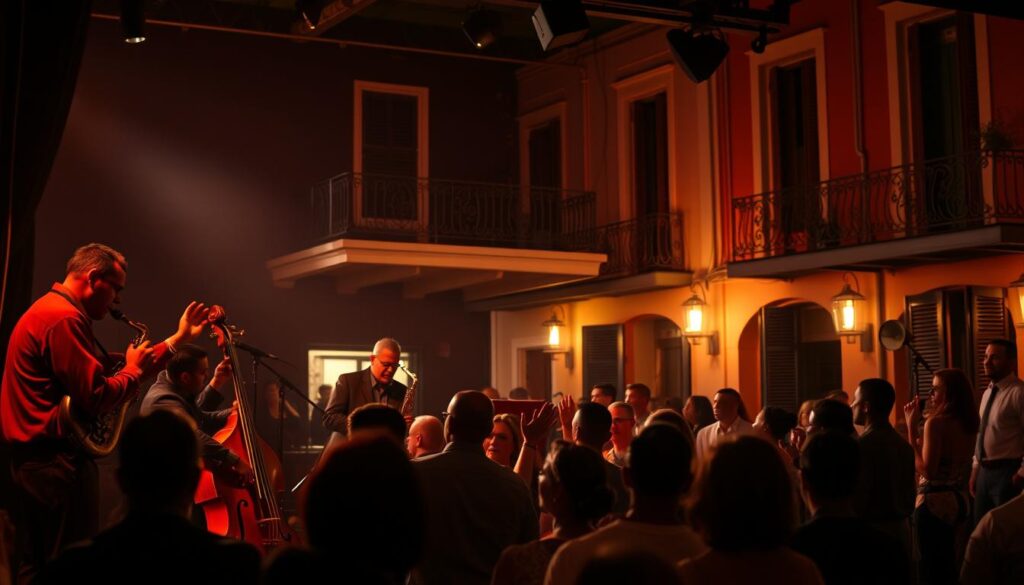Every year New Orleans organizes more than 130 festivals as the city celebrates its diverse jazz music genre through numerous celebrations. The city serves as a representation of how tourism hotspots establish themselves as vital cultural musical centers.
These musical destinations embody more than physical space because they play vibrant sounds which make them become living soundscapes. Music festivals and historic entertainment spaces have fashioned their principles by uniting traditional aspects with contemporary society.
Any visit to these destinations provides distinctive encounters since history and modern life create harmonious connections. Detroit and New Orleans offer visitors a chance to discover their musical stories while broadcasting their distinctive musical vibes through soulful music and festive spirit respectively.
Key Takeaways
- The city of New Orleans stands as the central hub for jazz because it organizes more than 130 musical festivals every year.
- The music produced by Detroit through Motown has established permanent influences within the history of music.
- Widespread musical venues together with special festivals serve as indicators of what makes a city unique.
- New Orleans and Detroit provide visitors the chance to observe modern musical developments among the traditional genres found in these destinations.
- People who go to these locations can gain extensive knowledge about their musical roots.
Introduction: The Harmony of Cities and Music
The USA’s municipalities each have their own musical tempo that serves as the fundamental cultural pulse. These urban settings represent musical development sites since they function both as physical spaces and as musical performance platforms. History reveals that each American city plays its own musical part toward the evolution of national music through traditional and novel sound elements.
The progressive establishment enables new musical discoveries to occur
Many cities have formed their cultural characteristics thanks to their live musical activities. The evolution of great artists in jazz plus country music has flourished in the intimate clubs and grand concert halls alike. These performance spaces serve multiple functions since they develop creativity and generate original concepts.
Nashville has earned its connection with country music through its flourishing scene and New York created various music forms including hip hop from its diverse music clubs. Every city traces its musical development through specific elements that represent its special cultural traditions.
The Cultural Impact of Live Music in the U.S.
American culture maintains an indefensible stamp from its connection to live music throughout multiple generations. The musical creations from Detroit Motown and Memphis blues unified national identity. Local artistic communities with clubs serve as important guardians of musical heritage evolution for specific regions in the United States.
Various contemporary music styles continue to draw inspiration from the original works of these cities which exist today. Featuring both historical preservation and modern creative approaches leads to perpetual musical harmonies between urban environments and artistic creativity.
Detroit: Motown’s Birthplace and Musical Innovation
The musical heritage of Motown was founded in Detroit which has provided the sonic touchstone for multiple musical generations. The city stands as a landmark of cultural heritage because soulful music and innovative beats unite here. The live music scene of Detroit maintains an expanding presence because of historical roots and contemporary musical influences.
Historic Hitsville, U.S.A. and Soul Legacy
The legendary establishment known as Hitsville U.S.A. created Motown’s soul music genre. Historic Hitsville U.S.A. welcomed the renowned artists Diana Ross alongside Stevie Wonder to become their home. The studio’s walls still echo with the timeless hits that defined a generation.
Detroit has maintained an extensive musical heritage that grew from its ancestral heritage. The soul music produced in this place has permanently established its status as a worldwide musical landmark. The cultural establishment Hitsville U.S.A. serves today as a symbol that represents both creativity and vast cultural influence.

Modern Trends: From Techno to Hip-Hop
The musical mix in Detroit currently combines traditional soul rhythm with contemporary reimaginations. The city functions as a technological hub which gave birth to techno as an underground music phenomenon. Eminem amongst other artists succeeded in gaining prominence for Detroit’s hip-hop music genre.
The entertainment establishments throughout the city preserve Detroit’s musical heritage by welcoming contemporary music styles. Large festivals and intimate clubs exist harmoniously to create an active music atmosphere in Detroit. Detroit’s cultural force reaches worldwide beyond its spatial boundaries to define what plays on national and international music charts.
Detroit uses music to display its capacity for creativity and endurance. The dynamic musical events in the city present a combination of past traditions along with modern creative productions. All music enthusiasts can find exclusive experiences within Detroit because the city provides both historic attractions and emerging musical opportunities.
Memphis: Cradle of Blues, Rock ‘n’ Roll, and Soul
Memphis exists today due to its musical achievement that merges blues with rock ‘n roll and soul music into local cultural heritage. Through its influence the city formed sounds that became essential parts of American musical history and continues today as an essential landmark in American music history. People from all walks of life are inspired by Memphis because the city provides historic performance spaces alongside contemporary venues for everyone.
| Genre | Key Artists | Impact |
|---|---|---|
| Motown | Stevie Wonder, Diana Ross | Defined soul music globally |
| Techno | Juan Atkins, Derrick May | Pioneered electronic music |
| Hip-Hop | Eminem, Big Sean | Shaped modern rap culture |
Beale Street and Sun Studio represent two significant attractions visitors should experience
Beale Street functions as the main heartbeat of the musical scene throughout Memphis. Since the early 20th century Beale Street has served as a musical gathering point due to its energetic live shows. The nightclub and bar scene on Beale Street remains essential for music fans because it has presented B.B. King among other legends to its visitors.
Memphis residents call “Birthplace of Rock ‘n’ Roll” and known as Sun Studio the primary musical landmark of the city. The legendary music studio started the successful careers of Elvis Presley, Johnny Cash along with Jerry Lee Lewis. Today the facility serves as a creative hub and innovation center that pulls international visitors to its facilities.
Memphis maintains an extensive bond between its city streets and its musical heritage. Memphis cultural scene grows richer through its numerous small performance locations and venues. The city’s lively nature becomes evident through its development from traditional blues music into contemporary soul music.
Memphis plays a substantial role outside the city limits by developing musical trends which spread across national and international frontiers. The city maintains its inspirational power for individuals who respect its classic elements and the modern music admirers. The musical essence of America reveals itself to visitors in both Beale Street and Sun Studio during their exploration of Memphis.
The musical heritage deeply rooted in a place leads many to explore cities that have established themselves through their musical traditions
Famous music revolutions have originated from urban areas since ancient times. Every American city contributes distinctive sounds which contribute to the cultural diversity of America. Musical innovation happens through living and breathing stages which make up these musical locations.
These musical genres developed deeply through neighborhood practices backed by local customs and cultural aspects. Establishments dedicated to hosting concerts or intimate groups have sustained great performers who connect traditional music with new artistic directions.
The local geographical region together with cultural influences shape the musical characteristics that define each city. The existence of New Orleans’ energetic jazz community derives from its historical background coupled with cultural diversity in the city. The country musical heritage of Nashville developed from the Southern historical tradition combined with storytelling musical customs that characterize the region.
These urban domains encourage contemporary musicians and musical enthusiasts today. The historical roots of a city link directly to its contemporary musical presentation which sustains its musical heritage. The unique musical journeys in American music can be experienced through both the personal clubs in Austin or the majestic performance halls in New York.
Nashville establishes itself as the capital of American country music
Nashville’s streets hum with the soulful twang of guitars, a testament to its deep-rooted connection to country music. Music City serves as the primary home for country music so it has developed into the principal center that forms famous artists and creates songs which define entire periods.
Grand Ole Opry and the Country Music Hall of Fame
The Grand Ole Opry functions as Nashville’s most important cultural institution associated with music. The historic venue continues to welcome an ongoing line-up of country music performers including both legendary artists of the past and present-day stars. The venue functions as an axis for musical discovery since it launched the careers of musicians such as Dolly Parton and Johnny Cash thus writing its name in music annals.
Another landmark, the Country Music Hall of Fame, preserves the legacy of the genre. The Country Music Hall of Fame presents unique historical musical artifacts alongside stories and memorabilia from key artists of country music history. These establishments demonstrate how Nashville functions as the cultural headquarters of this musical movement.
| Genre | Key Artists | Impact |
|---|---|---|
| Blues | B.B. King, Howlin’ Wolf | Pioneered the Delta blues sound |
| Rock ‘n’ Roll | Elvis Presley, Jerry Lee Lewis | Revolutionized popular music |
| Soul | Otis Redding, Isaac Hayes | Defined the Memphis soul movement |
Live Music Venues and Emerging Artists
Nashville maintains its lively music environment through large entertainment spaces along with its small intimate music venues. The Bluebird Cafe functions as a starting point for new musical performers since it provides emerging artists with opportunities to display their narratives. The music establishments combine classic country musical elements with modern developments to form an alive acoustic mix.
The development of fresh music talent depends greatly on both recording studios and music shops operating within the local community. The city of Nashville develops country music through its recording industry and acts as a catalyst for new country music breakthroughs. Nashville delivers innovation at the heart of its system to ensure that the city’s lasting impact continues forward.
Nashville lets visitors explore both historic landmarks and emerging artists’ work to take them on a distinctive music exploration in the country heartland. Every music enthusiast should place this destination on their travel list because its traditional heritage combines with contemporary attractions.
New Orleans: The Epicenter of Jazz and Cultural Fusion
The original city of jazz music New Orleans continues existing as a cultural center marrying historical foundations to contemporary development. The musical revolution’s center remains this city which merges together European, African along with Caribbean musical elements into an original acoustic expression. Modern stages along with historic venues have established New Orleans as a city that motivates both local performers and international concertgoers.
Historic Jazz Venues and Preservation Hall
The New Orleans jazz heritage traces its roots back to Preservation Hall. This notable venue built in 1961 continues to present numerous shows as it upholds the true early jazz musical style. The space provides a natural environment where people can hold a genuine encounter with traditional jazz performances.
Besides Preservation Hall two other historic venues the Dew Drop Inn and the Maple Leaf Bar continue to be essential elements in creating the distinctive musical character of the city. The historical spaces sustain living musical traditions by developing top performers who carry on jazz heritage until today.

The Mardi Gras Effect on Music Culture
Mardi Gras stands as a musical tribute to the entire emotional core of New Orleans music and culture. Accent the musical landscape with numerous performances generated by Mardi Gras which combines jazz with blues and rock for a vital cultural composition. Throughout history Mardi Gras evolved into a creative ground which links classic musical elements with contemporary sonic developments.
This celebration extends its influence everywhere from its local territory to create music developments worldwide. The city draws global artists and music lovers because of its lively creative spirit that keeps New Orleans as the leading hub of musical advancement.
Time coupled with traditional musical practices has created the remarkable musical history of New Orleans. The musical heritage of New Orleans exists in full force between Preservation Hall and Mardi Gras celebrations in the streets. People who visit New Orleans can embark on an exceptional jazz experience either by touring traditional spaces or attending contemporary musical events.
New York City: The Urban Beat of Musical Evolution
New York City exists as a rhythm-driven entity that represents its musical essence. The Bronx gave birth to hip-hop but Brooklyn became home to diverse musical expressions while the city combined all these creative forces into one dynamic musical landscape. Musical legends emerged from this street environment because they initiated music trends that influence the global scene.
The urban lifestyle of the city has allowed musical diversity to evolve continuously. The musical innovation processes in Harlem and Greenwich Village and Williamsburg have transformed these districts into standard symbols of creative output. The urban zones in the city combine different music perspectives that unite traditional music with modern experimental techniques.
Since its inception Hip-Hop music originated in the city alongside various diverse musical styles.
New York City created hip-hop as a musical movement that first appeared in the Bronx streets during the 1970s. The global movement of hip-hop was kicked off by musical pioneers Grandmaster Flash and Run-D.M.C. Maintaining its hip-hop energy since its origins the city produces famous artists such as Jay-Z and Cardi B who eliminate the musical legacy.
NYC music fans have the joy of experiencing hip-hop as well as jazz and rock and electronic music and many additional genres. The celebration of groundbreaking performances occurs in famous venues which include the Apollo Theater and CBGB. Elements of music production and performance within these cultural spaces maintain both developing creatives and shelter the musical traditions of New York City.
The city’s cultural scene reaches its peak every year through important events such as Governors Ball and Summer Stage. The festivals and events welcome various musical genres through which new artists showcase their talents. Formal venues maintain an active musical connection with street culture which leads to the development of an evolving musical environment.
Seattle: The Grunge Revolution and Beyond
During the 1990s Seattle’s music scene burst onto the scene to create a permanent transformation in the rock music genre. The emergence of the grunge movement drove authentic and energetic music to become the new center of international alternative music while establishing it as a global hub. During the 1990s Nirvana along with Pearl Jam and Soundgarden became the foundational bands who used raw lyrics to create expressive musical masterpieces.
The musical revolution extended beyond sound because it transformed modern culture at large. Seattle transformed its underground music venues into businesses that developed artistic talent by supporting authentic artistic presentation rather than commercial success. This innovative spirit of rebellion spread globally from the cultural center of the city.
The combination of clubs and record stores in Seattle became the birthplace for a revolutionary musical movement known as Grunge.
The Seattle music culture flourished due to The Crocodile and The Showbox that acted as fundamental venues leading the rise of the grunge movement. The venues allowed unsigned performers to find their fans through live musical experiences. Easy Street Records served as a cultural center that united music fans with artists who both found their favorite new music there.
Today Seattle preserves the musical elements of both jazz and soul which shape its current music culture. The diverse musical legacy of Seattle was enriched through the successful movement of grunge but also supported by other established musical styles. Community centers together with local halls function as talent incubators through which they shield the live concert tradition.
- Within the music world Grunge caused revolutionary changes since it brought raw and unprocessed musical sounds to the forefront.
- The active music community grew from cultural hubs like music clubs combined with record stores.
- Popular shows staged at The Crocodile transformed musical direction of significant groups.
- The contemporary music in Seattle uses original grunge elements together with current experimental musical approaches.

Music culture in Seattle currently thrives both dynamically and significantly. Throughout the city various music events ranging from community stages to major festivals maintain a respect for grunge tradition and welcome modern music movements. Traditional values combine with emerging musical patterns to keep the musical heritage of Seattle alive.
Austin: The Live Music Capital and Festival Hub
Austin’s street atmosphere plays out with continuous live musical performances which attract dedicated music fans. The live music capital title fits Austin perfectly since over 250 performance spaces holding a wide range of musical events exist throughout its territory. Through its exciting musical past combined with its passionate concert life Austin has earned its status as a worldwide musical center.
Iconic Festivals and Intimate Music Venues
The famous festival scene in Austin includes international events such as SXSW and Austin City Limits that attract multitudes from all corners of the globe. The SXSW event serves as a combined showcase for film, technology and music as it acts as an entrance point for upcoming performers. Austin City Limits showcases both prominent musicians and performers who are starting their careers in addition to musicians from various music genres. Through these events Austin displays its talent of combining traditional events with creative approaches.
The tiny concert venues of Austin maintain their position as essential components which maintain the music scene of the city. Two significant musical venues located in Austin are the Continental Club and Antone’s where legendary performances have taken place since decades. The designated areas provide music enthusiasts with exceptional encounters that enable them to experience artists through direct interactions. These venues actively work to maintain the status of Austin as a prominent music venue.
Austin continues adapting to musical trends starting from its blues and country origins through its present-day contrast of musical styles. Throughout its existence the city accumulated numerous key historical moments that combine local fame with international fame and musical celebrations. Austin stays leading in live music because it skillfully unites historical elements with current trends.
Austin maintains its expansion through modern trends but it celebrates its original foundations. Austin’s music success is preserved through the active participation of its creative and music-loving community. Any visitor can discover historic venues or modern concerts within Austin as the city guides visitors through the essence of live music experiences.
The city of Los Angeles builds its rock music heritage from its famous recording studios while maintaining its legendary status in rock history.
Rock legends and recording pioneers have consistently sought out Los Angeles as their base in the past. As a music city this location has developed musical sounds that combine basic raw power with sophisticated advances in production. The legendary Hollywood recording studios together with Sunset Strip define LA as the ultimate musical powerhouse of rock and pop history.
Sunset Strip History and Hollywood’s Musical Ties
The Sunset Strip stands as a central hub for all the rock history that has developed in Los Angeles. During the 1960s through the 1970s the Sunset Strip welcomed legendary acts The Doors and Guns N’ Roses to its lineup of famous venues. The Whisky a Go Go and the Roxy Theatre served as historic stages that contributed to Sunset Strip’s status as a cultural landmark of the city.
Recording studios within Hollywood played an essential part in developing what became known as music city. Capitol Records and Sunset Sound studios created historic album recordings which combined rock with both pop and soul music. The venues caring for musical development and protecting the historical music heritage of the city represent significant cultural institutions.
- Iconic Venues: The Whisky a Go Go, Roxy Theatre, and Troubadour.
- Legendary Bands: The Doors, Guns N’ Roses, and Fleetwood Mac.
- Two historical landmarks merge into one business venture when Capitol Records joined forces with Sunset Sound.




